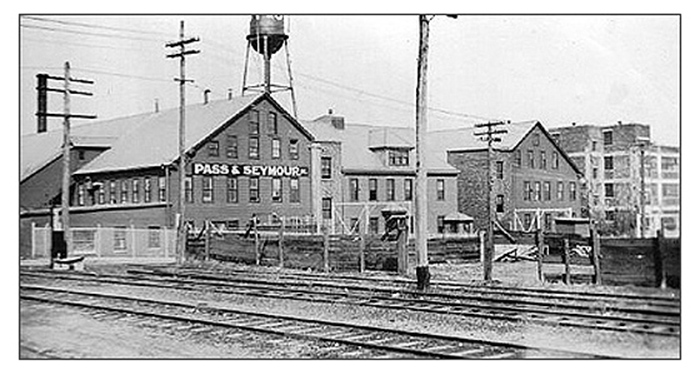Syracuse Herald-Journal, October 21, 1941
Firm Formed To Meet
Need of Insulator
Pass and Seymour Now Turns Out
Most Products to Aid Defense
Need for a good insulator in the days when electricity was in its infancy supplied the chief reason, 51 years ago, for the formation of Pass & Seymour, Inc.
At its Solvay factory, the company today is turning out most of its products in the interests of the defense program. Among them are all types of porcelain lighting fixtures, electrical switches, plugs, sockets and wiring devices, all widely used in defense camps, cantonments, industrial housing areas and public buildings.
For the Navy, special switches for use on battleships and other types of combat vessels are being manufactured.
At the time of the firm’s founding, however, it was not even accepted that electricity was here to stay.
Pass & Seymour was an outgrowth of the Onondaga Pottery Company, a firm which today concentrates in the field of hotel and household vitrified china tableware. Organized in 1871, the pottery company was successor to the Empire China Company which had manufactured a line of kitchen ware, lavatory ware and earthen tableware.
Richard Pass, a potter of Staffordshire, England, was brought to Syracuse as superintendent of Onondaga Pottery in 1875. With him came his son, James Pass, who became a student of chemistry and an accomplished ceramic technologist. After the death of his father, James became superintendent in 1884. About the year 1888 he developed a vitreous, translucent and non-absorbent type of tableware of unusual strength, which has come to be known as American Type China.
At that time, Albert P. Seymour was superintendent of Syracuse’s lighting company. Observing the commonness of fires and shocks caused by inadequate insulation and poor wiring. Mr Seymour felt that if electricity were ti be widely used in home, store and factory, better wiring devices and insulation would be needed to make the energy safe as well as useful.
The insulators and wiring devices then in use were largely of wood, which when wet loses most of its insulating properties and when a short circuit takes place is apt to catch fire.
Convinced by tests that the new pottery developed by Pass would make good insulation, Pass & Seymour in 1890 formed a partnership for the manufacture of electrical porcelain.
Like the new product of the Onondaga Pottery Company, the electrical product was called at first “Syracuse China.”
In the early years, Pass & Seymour manufactured many types of electrical porcelain, both high tension and low tension, and about 1898 started the production of spark plug porcelains.
In 1900, the partnership was incorporated as Pass & Seymour, Inc., with trademark P&S. James Pass was elected president and Albert Seymour vice president and treasurer. Bert E. Salisbury, who had joined the firm in 1891 and been appointed superintendent in 1898, was elected secretary and appointed general manager.
The year of incorporation also saw the start of manufacture of evaporating dishes for chemical use, a development started through the keen interest of James Pass in chemical science. both evaporating dishes and crucibles were made, with the principal market in educational institutions. Because of relatively high wage scales in this country, Pass and Seymour found difficulty in competing against similar German products and about the year 1905 the line was discontinued.
Following the death of James Pass in 1913, Mr. Salisbury was elected president. He continued in this capacity until 1929 when Richard Henry Pass, a son of James Pass, succeeded him.
Officers of Pass and Seymour now are: Mr. Salisbury, chairman of the board; Mr. Pass, president; John W. Brooks, vice president; V. R. Nicholson, secretary and general sales manager.
Concerning latest developments in the firm, Mr. Pass comments:
“Last year we installed our first bakelite press in a program to make ourselves some — and possibly eventually all — of the many bakelite parts which now play so large a part in modern lines of wiring devices. The bakelite will supplement, but not supplant, porcelain as insulation, for I still maintain that porcelain, where it can be used practically, is still best of all electrical insulators.
“Recently we have developed and are producing in large quantity a new type of wall plate made of steel with a permanent surface covering which is corrosion proof and highly insulating.
“This product replaces plates made of brass and bakelite, both of which materials are in great demand for urgent defense requirements. Thus the use of our new plates is conserving substantial quantities of important defense materials.”
The Solvay plant employs approximately 625. Branch offices and warehouses are in New York City and Chicago, and warehouse stocks are maintained in Boston, San Francisco and Los Angeles.
Among a few of the many defense projects which Pass and Seymour has supplied with wiring devices and lighting fixtures are:
Camp Devens, Camp Edwards, Fort Dix, For Sill, the Glenn Martin bomber plant at Baltimore, the Panama Canal defenses, the Raritan Arsenal, the Jacksonville Air Base, Camp Blanding, Mare Island, Calif.; the Brooklyn Navy Yard, innumerable defense housing projects, Fort George G. Meade, Parris Island, Kelly Field, Borinquen Field, Puerto Rico, the Newfoundland Air Base, the Triniday Air Base and the Grumman Aircraft Factory, Long Island.
Operating under the Defense Supplies Rating Plan, Pass & Seymour, Inc., has a priority rating of A-10 on defense business, which is now the major part of its production.
In addition, on its output of special switches for the Navy it has as A-1-A rating. The 625 people at present employed at the Solvay plant compare with out 475 employed a year ago. |

